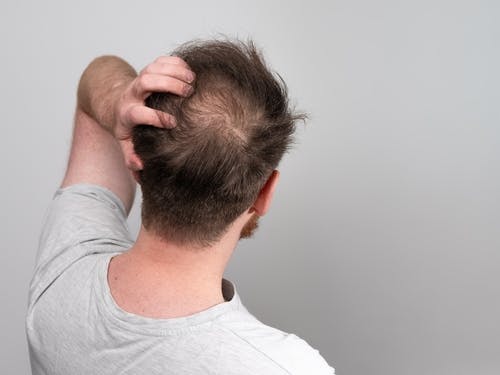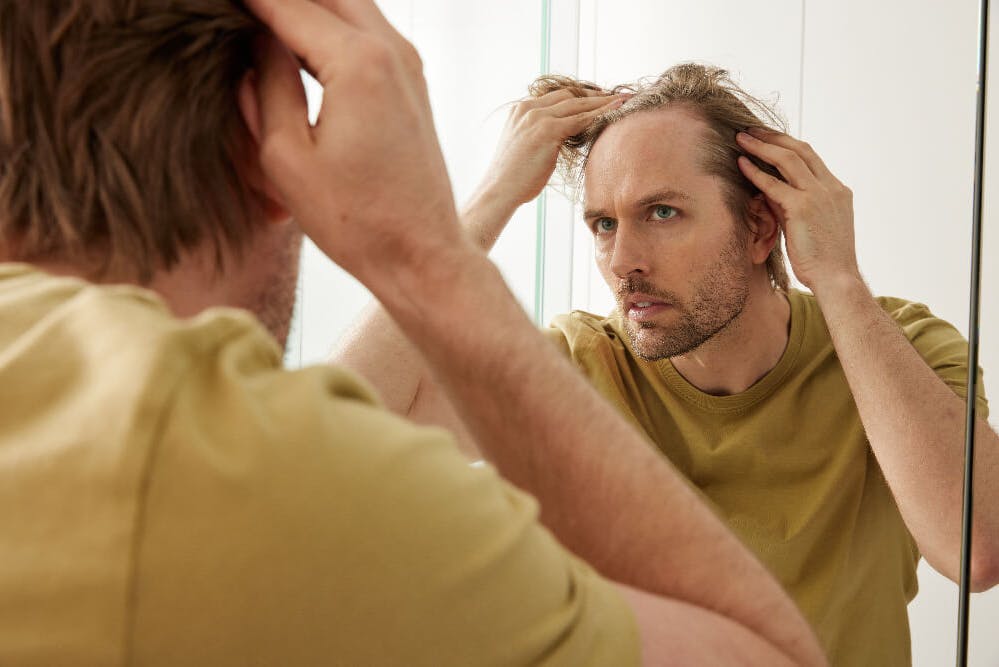How does the hair cycle work?
To understand how much hair loss is normal, you should first understand that all hair goes through a natural cycle of growth and shedding. There are three phases:[1]
- Anagen is the growth phase of the hair cycle. It refers to the period when cells in the hair bulb divide rapidly.
- Catagen is the transitional phase. It is characterised by the hair bulb moving into the mid-dermis before becoming a club or telogen hair.
- Telogen is the resting phase of the cycle. It typically lasts for three to four months before the hair is shed, and it cycles back to the anagen phase.
Is it normal to lose 100 strands of hair per day?
Yes, it is normal. The average person has about 100,000 hair follicles residing on their scalp. Each hair follicle has the potential to generate hair, which will then grow, rest, fall out, and regrow within approximately three years. Over the course of 1,000 days, it is estimated that a person loses 100,000 hairs or about 100 hair strands per day.[2]
Now that you have an idea of how much hair loss is normal, if you think you are losing a great deal more than that every day, you can make efforts to keep track of your daily shedding. Of course, you can’t be expected to account for every single strand of hair that detaches from your crown.
Instead of trying to count the hairs on your pillow or the shower drain, you can keep a record of any hair loss patterns you may be experiencing by taking pictures of your hairline every few weeks or months. If you notice any drastic changes, it may be time to consult with your Mosh doctor.
What are the different types of hair loss?
When it comes to how much hair loss is normal, it can depend on the type you have. Hair loss can occur in many different forms and have various causes. The most common types of hair loss include:[3]
- Shedding (telogen or anagen effluvium). As described above, it’s normal for hair to shed at the end of each hair cycle. However, there are conditions that can cause an abnormal amount of shedding, including pregnancy, severe illness, certain medications, and chemotherapy.
- Androgenic alopecia (male-pattern baldness). This is caused by a hormone called dihydrotestosterone (DHT) and is characterised by a receding hairline and thinning at the crown for most men.
- Alopecia areata. This is a disorder that causes patchy hair loss on the scalp, face, and/or other parts of the body. Sometimes, alopecia areata sufferers experience spontaneous regrowth of their hair in patches since the follicles are not completely destroyed. Some extreme cases may even cause total shedding all over.
- Scarring alopecia. This type of hair loss is caused by inflammation that damages or destroys the hair follicles, resulting in permanent hair loss.
Do women tend to lose more hair than men?
It is difficult to assess the difference in how much hair loss is normal for men and women. Men may experience more extensive balding, but women also lose large amounts of hair.[4]
Regular styling and frequent hair colouring also play a large role in hair shedding. Men and women wear their hair differently, which can influence their daily hair loss, but a significant percentage of women experience hair shedding during styling.[5]
Hair loss is different for every individual. Aside from gender, your age, genetics, nutrition, lifestyle, and medical history can all play a factor in the health of your hair. That’s why an ideal treatment would consider all of these to cater to your specific situation.
At Mosh, you can consult with doctors in Australia who can help you get to the root of your hair problems. Get science-backed advice on what helps hair growth and how to thicken hair growth. If deemed necessary for your situation, they can provide you with the appropriate medication and outline a personally tailored hair treatment plan to help you grow back and maintain your hair.
Aside from dealing with hair loss, Mosh also specialises in dealing with taboo-breaking issues like weight loss, skin care, mental health, and sexual health.
If you are struggling with a mental health problem, our AHPRA-registered doctors are dedicated to your overall health and well-being.
The are happy to help you with any advice on how to cope with stress, how to relieve anxiety, and how to stop anxious thoughts. On the other hand, if you have any weight loss goals that you are trying to reach, you can ask questions during your consultation about which foods are good for losing weight or what exercise is best to lose weight.
There’s no need to keep staring at your hairline in the mirror, wondering how much hair loss is normal. If you are worried about your volume of hair fall, talk to us at Mosh!

